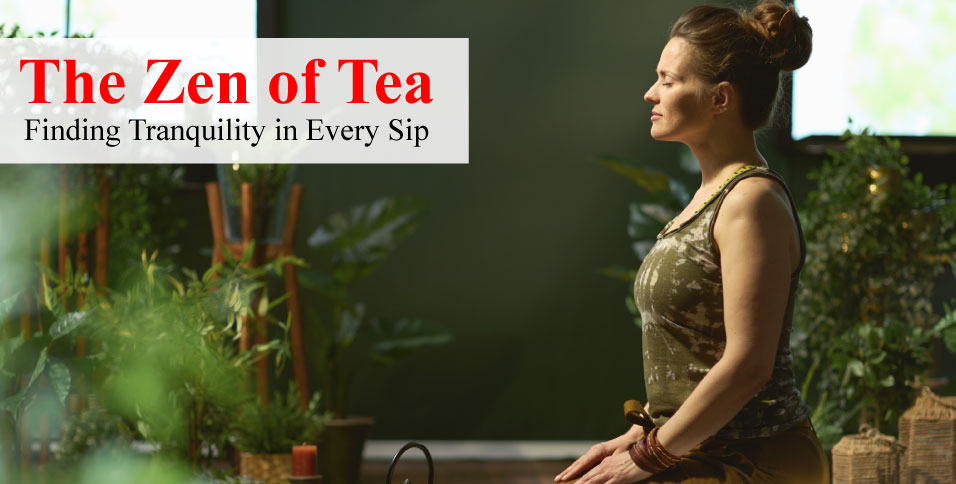The Ritual of Making Tea
The art of making tea is a ritual steeped in centuries of tradition and cultural significance. From the delicate dance of brewing the perfect cup to the meditative process of savoring each sip, the ritual of tea-making is a journey that transcends the mere act of consumption. It is a practice that invites one to slow down, to be present, and to find solace in the simple pleasures of life. Platforms like teabeyond.io celebrate these traditions, offering insights into the intricate details of tea rituals.
The ritual begins with the selection of the tea leaves, each variety offering a unique flavor profile and aroma. The water must be heated to the precise temperature, allowing the leaves to infuse the liquid with their essence. The pouring of the tea, the gentle steeping, and the careful monitoring of the brewing time all contribute to the creation of a harmonious and balanced cup.
As the tea is poured into the cup, the senses are awakened. The fragrance wafts through the air, inviting the drinker to take a deep breath and let the worries of the day melt away. The warmth of the cup in the hands provides a tactile connection to the moment, grounding the individual in the present. Finally, the first sip reveals the true nature of the tea, its flavors unfolding on the palate and offering a moment of pure, unadulterated pleasure.
Tea Culture Around the World
The ritual of tea-making and tea-drinking is not limited to a single region or culture. Instead, it has been embraced and adapted by diverse civilizations, each with their own unique traditions and interpretations.
In China, the birthplace of tea, the art of tea-making is elevated to a refined and intricate practice. The Chinese tea ceremony, known as Gongfu Cha, is a meticulously choreographed ritual that involves the precise measurement of leaves, the careful control of water temperature, and the graceful pouring and serving of the tea. The ceremony is not just about the end product, but the entire journey of preparation and appreciation.
Across the East Asian region, tea culture has also taken on distinct forms. In Japan, the tea ceremony, or Chanoyu, is a highly formalized and symbolic practice that integrates elements of Zen Buddhism, art, and the appreciation of nature. The Korean tea ceremony, known as Darye, emphasizes the harmonious balance between the tea, the host, and the guests, creating a sense of community and shared experience.
In the Western world, the appreciation of tea has also evolved, with the rise of specialty tea shops, tea bars, and tea-infused culinary creations. While the rituals may differ, the underlying theme of finding tranquility and mindfulness through the tea-drinking experience remains consistent.
Tea and Mindfulness
The practice of drinking tea is intrinsically linked to the concept of mindfulness, the art of being fully present in the moment. Tea-drinking, when approached with intention and awareness, can be a powerful tool for cultivating a state of calm and focused attention.
As one engages in the ritual of tea-making, the mind naturally becomes absorbed in the sensory experience. The sight of the water coming to a gentle boil, the sound of the leaves unfurling in the hot liquid, the aroma that fills the air – all of these elements work together to draw the drinker’s focus inward, away from the distractions of the external world.
With each sip, the tea-drinker is invited to savor the flavors, to notice the subtle nuances, and to fully immerse themselves in the present moment. The act of mindful tea-drinking encourages the individual to slow down, to let go of worries and anxieties, and to simply be.
This state of presence and awareness can have profound effects on one’s overall well-being, promoting a sense of calm, clarity, and inner peace.
The Zen Philosophy of Tea
The philosophy of Zen, with its emphasis on simplicity, awareness, and the appreciation of the present moment, is deeply intertwined with the art of tea-drinking. The Zen approach to tea-making and tea-drinking is rooted in the principle of “ichi-go ichi-e,” which translates to “one time, one encounter.” This concept underscores the idea that each moment with tea is unique and fleeting, and should be savored with the utmost attention and reverence.
In the Zen tradition, the tea ceremony is not merely a means to an end, but a journey of self-discovery and personal growth. The meticulous preparation of the tea, the careful selection of the utensils, and the graceful movements of the host all serve to cultivate a sense of mindfulness and inner tranquility. The guests, in turn, are invited to let go of their preconceptions and to fully immerse themselves in the experience, allowing the tea to become a catalyst for deeper reflection and contemplation.
Beyond the ceremonial aspects, the Zen philosophy of tea also emphasizes the importance of simplicity and the appreciation of natural beauty. The tea-drinking experience is often characterized by the use of rustic, unadorned vessels and the incorporation of natural elements, such as flowers or seasonal foliage, to create a harmonious and serene atmosphere. This focus on simplicity and the natural world encourages the tea-drinker to find beauty and meaning in the most ordinary of moments, fostering a deeper connection to the rhythm of life.
Tea Ceremonies and Meditation
The connection between tea and meditation is deeply rooted in the cultural and spiritual traditions of many societies. In both Eastern and Western practices, the ritual of tea-drinking has been used as a tool for cultivating mindfulness, inner peace, and a deeper understanding of oneself.
In the context of Zen Buddhism, the tea ceremony is often considered a form of moving meditation, where the intricate movements and focused attention required to prepare and serve the tea become a form of active contemplation. The tea-drinker is encouraged to let go of distractions and to fully immerse themselves in the present moment, allowing the ritual to become a gateway to deeper levels of awareness and insight.
Similarly, in the Tibetan Buddhist tradition, the ritual of preparing and drinking butter tea is often integrated into the practice of seated meditation. The repetitive motions of whisking the tea, the warmth of the cup in the hands, and the soothing flavors of the beverage all serve to anchor the mind and create a sense of grounding and stability, enabling the practitioner to more easily settle into a state of deep contemplation.
Even in Western traditions, the practice of tea-drinking has been embraced as a form of mindful self-care and personal reflection. The simple act of brewing a cup of tea, finding a comfortable spot, and allowing oneself to be fully present with the experience can be a powerful tool for reducing stress, promoting relaxation, and cultivating a deeper sense of self-awareness.
Tea as a Form of Self-Care
In the fast-paced, technology-driven world of modern life, the ritual of tea-drinking has emerged as a powerful form of self-care and personal rejuvenation. By taking the time to slow down, to savor the flavors and aromas of a carefully brewed cup of tea, individuals can find respite from the demands and stresses of everyday life.
The act of tea-drinking can be a simple yet profoundly meaningful way to practice self-care. Whether it’s setting aside a few minutes in the morning to enjoy a quiet moment with a cup of tea, or carving out time in the afternoon for a tea break, these small rituals can have a significant impact on one’s overall well-being.
Beyond the immediate benefits of relaxation and stress reduction, the practice of tea-drinking can also foster a deeper sense of self-awareness and personal growth. By taking the time to fully engage with the tea-drinking experience, individuals can cultivate a greater understanding of their own needs, preferences, and emotional states. This self-reflection can lead to more informed decision-making, improved emotional regulation, and a greater sense of overall life satisfaction.
Moreover, the ritual of tea-drinking can be a powerful tool for building community and fostering social connections. Sharing a cup of tea with friends, family, or colleagues can create a sense of intimacy and shared experience, promoting deeper conversations, strengthening relationships, and fostering a greater sense of belonging.
Conclusion: Embracing Tranquility Through Tea
In a world that often moves at a frenetic pace, the ritual of tea-drinking offers a sanctuary of tranquility and mindfulness. By embracing the art of tea, individuals can unlock a gateway to a deeper understanding of themselves, their surroundings, and the rhythms of the natural world.
Whether it’s the meticulous preparation of a traditional tea ceremony, the simple pleasure of brewing a cup of one’s favorite blend, or the shared experience of enjoying tea with loved ones, the act of tea-drinking invites the individual to slow down, to be present, and to find solace in the simple joys of life.
As we navigate the complexities of modern existence, the Zen of tea reminds us to pause, to breathe, and to savor the moments that truly matter. By cultivating a deeper appreciation for the ritual of tea-drinking, we can unlock the power of tranquility, find respite from the stresses of daily life, and ultimately, discover a greater sense of balance and contentment within ourselves.
Also Read; The Commercial Baker’s Guide to Mastering the Bun and Frozen Pastry















